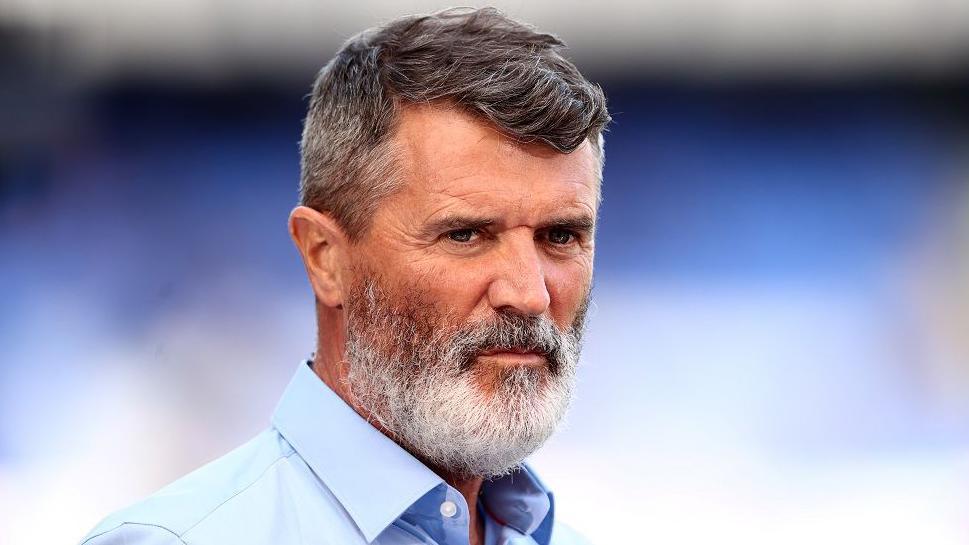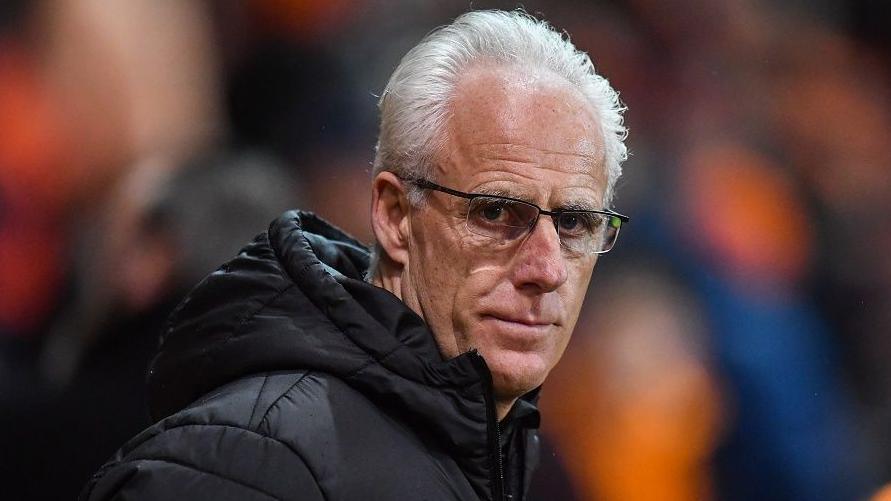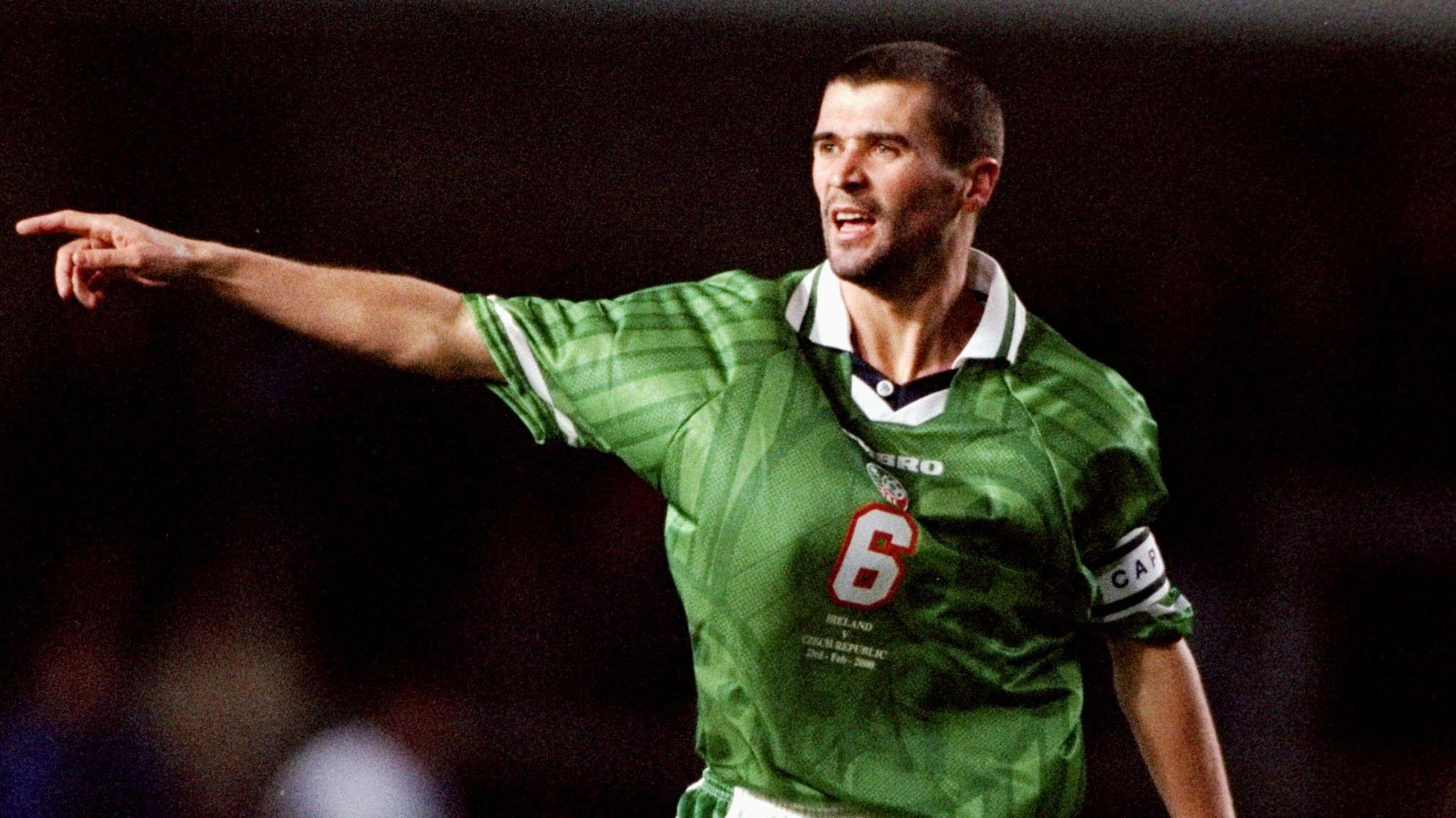What triggered the Roy Keane row in Saipan?

Roy Keane is one of Ireland's most successful footballers
- Published
It was an "almighty row" that split opinion in Ireland and even the offer of a diplomatic intervention from the head of the government could not sort it out.
The bitter bust-up between footballer Roy Keane and his former team-mate, ex-Republic of Ireland manager Mick McCarthy, is now heading for the big screen.
The pair clashed on the Pacific island of Saipan days before the 2002 World Cup, ending in a furious McCarthy sending Keane home from the team's training camp.
The Cork man was then the captain of his national team and its best-known, most successful player.
The trigger? Keane had given a newspaper interview in which he criticised the team's training facilities, including the "rock hard" pitch and missing equipment.
"It did divide the nation," Keane's biographer Eamon Dunphy told the BBC's Good Morning Ulster programme.
"It came down to whether you supported Mick McCarthy's decision to send Roy Keane home, or whether you believed that Keane's criticism was moderate enough and was justified - and I did."

Mick McCarthy managed the Republic from 1996 to late 2002
'No goal posts'
Dunphy, a well-known Irish sports writer and pundit, got to know Keane better than most when the footballer asked him to ghostwrite his 2002 autobiography.
"I was seeing him quite regularly and had a good relationship with him," he explained.
Dunphy visited Keane's family home on several occasions and met the footballer's wife and young children while gathering information for their book.
Keane later fell out with Dunphy over a separate matter, but the pundit still insists that the player was right to speak out about the World Cup preparations in Saipan.
"They had no training pitch that was fit for purpose, it was pretty bleak." Dunphy explained.
"And Keane was carrying a hip injury - the pitch didn't suit him, it was rock hard.
"There was no goal posts, nothing like that. So he felt Ireland were being unprofessional, he blamed McCarthy for it."
Keane's criticisms of the team's preparations were laid bare in an Irish Times article, published in May 2002.
In the interview, Keane insisted he was "not being a prima donna" but complained that players were likely to get injured on a pitch he believed was "dangerous".
"I can’t imagine any other country, countries in the world who are far worse off than us, playing on something like that," the player said.
"I don’t think it’s too much for us to ask, just for a pitch that’s even watered."

Roy Keane will be portrayed in the film by fellow Corkman Éanna Hardwicke
'It was a big deal'
Dunphy said that for some fans, Keane was seen as "petulant" and "irresponsible" in his role as captain, rowing with the boss and letting down a team who needed him.
"He had done more than anyone, as a player, to get us there in the first place," the pundit pointed out.
"The team went on to do really well in the games that followed.
"Most people believe if Keane had stayed we'd have gone further in the World Cup, maybe to a semi-final, so it was a big deal for football people."
The row made headlines for months and even then then taoiseach (Irish prime minister) Bertie Ahern offered to intervene.
Mr Ahern had helped bring peace to the island of Ireland by negotiating the Good Friday Agreement, but even his diplomatic skills could not end the soccer stand-off.
Keane would not represent the Republic again until after McCarthy's reign ended.
Dunphy suggests the player's relationship with McCarthy had been fractious for a long time before they landed in Saipan.
"I don't think they were kindred spirits," he said.
"When they played together - when McCarthy was in the team as opposed to managing it - they didn't get on very well, so there was history there."
Cast announced for upcoming Roy Keane Saipan film
- Published29 July 2024
'Some handsome actor'
The forthcoming film is not the first time that the Saipan saga has been recreated in artistic form.
The comedy musical I Keano - which portrayed Keane and McCarthy as warriors preparing for battle in Ancient Rome - opened on a Dublin stage in 2005.
A decade later, Keane attended that show in person, along with other members of the Irish team which he was then helping to manage.
For the film, Alan Partridge star Steve Coogan is preparing to take on the role of McCarthy, while Keane will be played by Bafta-nominated actor Éanna Hardwicke.
That has left Eamon Dunphy wondering who will be cast as Keane's biographer.
"I'm hoping to be played by some handsome actor and I believe I've just seen a name - Hugh Jackman, is it?" he joked.
Jackman's unconfirmed involvement in the film was suggested by the satirical news website Waterford Whispers, external.
The site also made the unlikely claims that Clint Eastwood and the late Humphrey Bogart have been lined up for roles in the production.
But Dunphy has his own ideas about who should play him in the film.
"I want Paul Mescal, he seems to be the man of the moment."